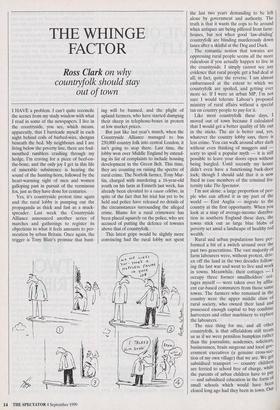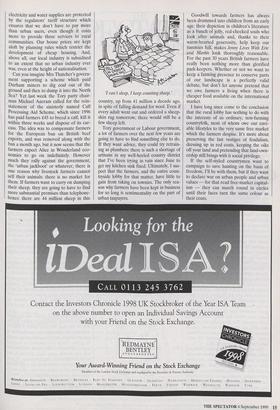THE WHINGE FACTOR
Ross Clark on why
countryfolk should stay out of town
I HAVE a problem. I can't quite reconcile the scenes from my study window with what 1 read in some of the newspapers. I live in the countryside, you see, which means, apparently, that I barricade myself in each night behind coils of barbed-wire, shotgun beneath the bed. My neighbours and I are living below the poverty line, there are foul- mouthed ramblers crashing through my hedge, I'm craving for a piece of beef-on- the-bone, and the only joy I get in this life of miserable subsistence is hearing the sound of the hunting-horn, followed by the heart-warming sight of men and women galloping past in pursuit of the verminous fox, just as they have done for centuries.
Yes, it's countryside protest time again and the rural lobby is pumping out the propaganda as thick and fast as a muck- spreader. Last week the Countryside Alliance announced another series of marches and gatherings to register its objections to what it feels amounts to per- secution by urban Britain. Once again, the trigger is Tony Blair's promise that hunt- ing will be banned, and the plight of upland farmers, who have started dumping their sheep in telephone-boxes in protest at low market prices.
But just like last year's march, when the Countryside Alliance managed to bus 250,000 country folk into central London, it isn't going to stop there. Last time, the lobby won over Middle England by extend- ing its list of complaints to include housing development in the Green Belt. This time, they are counting on raising the spectre of rural crime. The Norfolk farmer, Tony Mar- tin, charged with murdering a 16-year-old youth on his farm at Emneth last week, has already been elevated to a cause célebre, in spite of the fact that his trial has yet to be held and police have released no details of the circumstances surrounding the alleged crime. Blame for a rural crimewave has been placed squarely on the police, who are accused of putting the defence of townies above that of countryfolk.
This latest gripe would be slightly more convincing had the rural lobby not spent the last two years demanding to be left alone by government and authority. The truth is that it wants the cops to be around when antiques are being pilfered from farm- houses, but not when good law-abiding' countryfolk are blinding murderously down lanes after a skinful at the Dog and Duck.
The romantic notion that townies are oppressing rural people seems all the more ridiculous if you actually happen to live in the countryside. I simply cannot see any evidence that rural people get a bad deal at all; in fact, quite the reverse. I am almost embarrassed at the extent to which we countryfolk are spoiled, and getting ever more so. If I were an urban MP, I'm not sure I would tolerate Labour's proposed ministry of rural affairs without a special tax on country people to pay for it.
Like most countryfolk these days, I moved out of town because I calculated that I would get a better quality of life out in the sticks. The air is better and, yes, whatever the country lobby says, there is less crime. You can walk around after dark without even thinking of muggers and sorry to spoil a popular myth — it is still possible to leave your doors open without being burgled. Until recently my house didn't even have a functioning back-door lock; though I should add that it is now fixed in case members of the criminal fra- ternity take The Spectator.
I'm not alone: a large proportion of peo- ple who can afford it in my part of the world — East Anglia — migrate to the country at the first opportunity. When you look at a map of average-income distribu- tion in southern England these days, the towns stick out as large blue blobs of poverty set amid a landscape of healthy red wealth.
Rural and urban populations have per- formed a bit of a switch around over the past two generations. The vast majority of farm labourers were, without protest, driv- en off the land in the two decades follow- ing the last war and went to live and work in towns. Meanwhile, their cottages — I occupy three former smallholders' cot- tages myself — were taken over by afflu- ent car-based commuters from those same towns. The farmers who remained in the country were the upper middle class of rural society, who owned their land and possessed enough capital to buy combine harvesters and other machinery to replace the labourers.
The nice thing for me, and all other countryfolk, is that officialdom still treats us as if we were penniless bumpkins rather than the journalists, academics, solicitors, businessmen, brain surgeons and local gov- ernment executives (a genuine cross-sec- tion of my own village) that we are. We get subsidised transport — country children are ferried to school free of charge, while the parents of urban children have to paY — and subsidised education in the form Of small schools which would have been closed long ago had they been in town. Our electricity and water supplies are protected by the regulators' tariff structure which ensures that we don't have to pay more than urban users, even though it costs more to provide these services to rural communities. Our house prices are kept aloft by planning rules which restrict the development of cheap housing. And, above all, our local industry is subsidised to an extent that no urban industry ever was, even at the height of nationalisation.
Can you imagine Mrs Thatcher's govern- ment supporting a scheme which paid Durham miners to dig coal out of the ground and then to dump it into the North Sea? Yet last week the Tory party chair- man Michael Ancram called for the rein- statement of the sinisterly named Calf Processing Aid Scheme, which since 1996 has paid farmers £45 to breed a calf, kill it within three weeks and dispose of its car- cass. The idea was to compensate farmers for the European ban on British beef exports, and was removed along with the ban a month ago, but it now seems that the farmers expect Alice in Wonderland eco- nomics to go on indefinitely. However much they rally against the government, the 'urban jackboot' or whatever, there is one reason why livestock farmers cannot sell their animals: there is no market for them. If farmers want to carry on dumping their sheep, they are going to have to find more substantial premises than telephone- boxes: there are 44 million sheep in this I can't sleep, I keep counting sheep.'
country, up from 41 million a decade ago, in spite of falling demand for wool. Even if every adult went out and ordered a sheep- skin rug tomorrow, there would still be a few sheep left.
Tory government or Labour government, a lot of farmers over the next few years are going to have to find something else to do. If they want advice, they could try retrain- ing as plumbers: there is such a shortage of artisans in my well-heeled country district that I've been trying in vain since June to get my kitchen sink fixed. Ultimately, I sus- pect that the farmers, and the entire coun- tryside lobby for that matter, have little to gain from taking on townies. The only rea- son why farmers have been kept in business for so long is sentimentality on the part of urban taxpayers. Goodwill towards farmers has always been drummed into children from an early age: their depiction in children's literature as a bunch of jolly, red-cheeked souls who look after animals and, thanks to their warm-hearted generosity, help keep our tummies full, makes Jenny Lives With Eric and Martin look thoroughly reasonable. For the past 30 years British farmers have really been nothing more than glorified park-keepers. Whether or not we want to keep a farming presence to conserve parts of our landscape is a perfectly valid debate, but don't let anyone pretend that we owe farmers a living when there is cheaper food available on the international market.
I have long since come to the conclusion that the rural lobby has nothing to do with the interests of us ordinary, non-farming countryfolk, most of whom owe our envi- able lifestyles to the very same free market which the farmers despise. It's more about preserving the last vestiges of feudalism, dressing up in red coats, keeping the oiks off your land and pretending that land-own- ership still brings with it social privilege.
If the self-styled countrymen want to campaign to save hunting on the basis of freedom, I'll be with them, but if they want to declare war on urban people and urban values — for that read free-market capital- ism — they can march round in circles until their faces turn the same colour as their coats.



























































 Previous page
Previous page